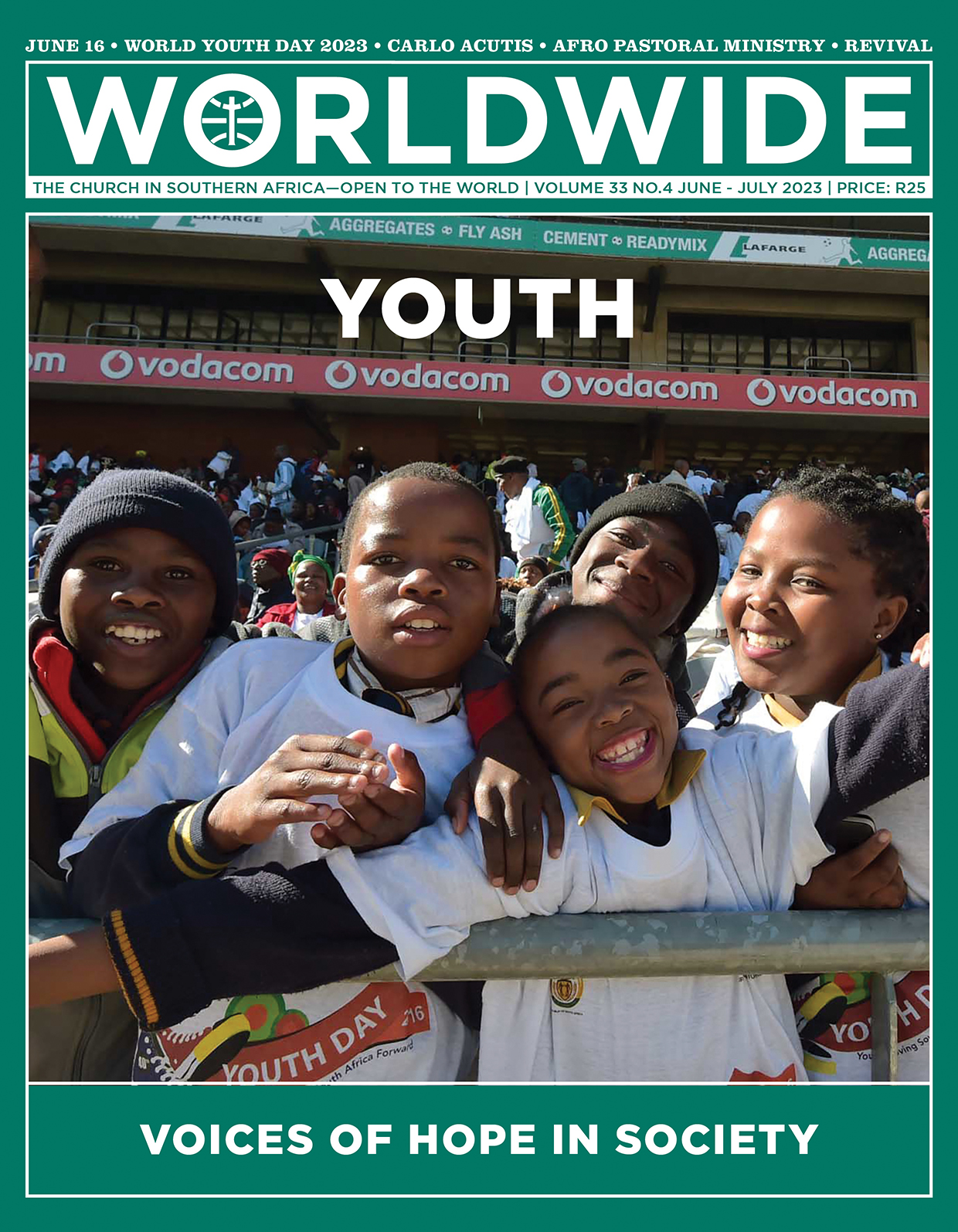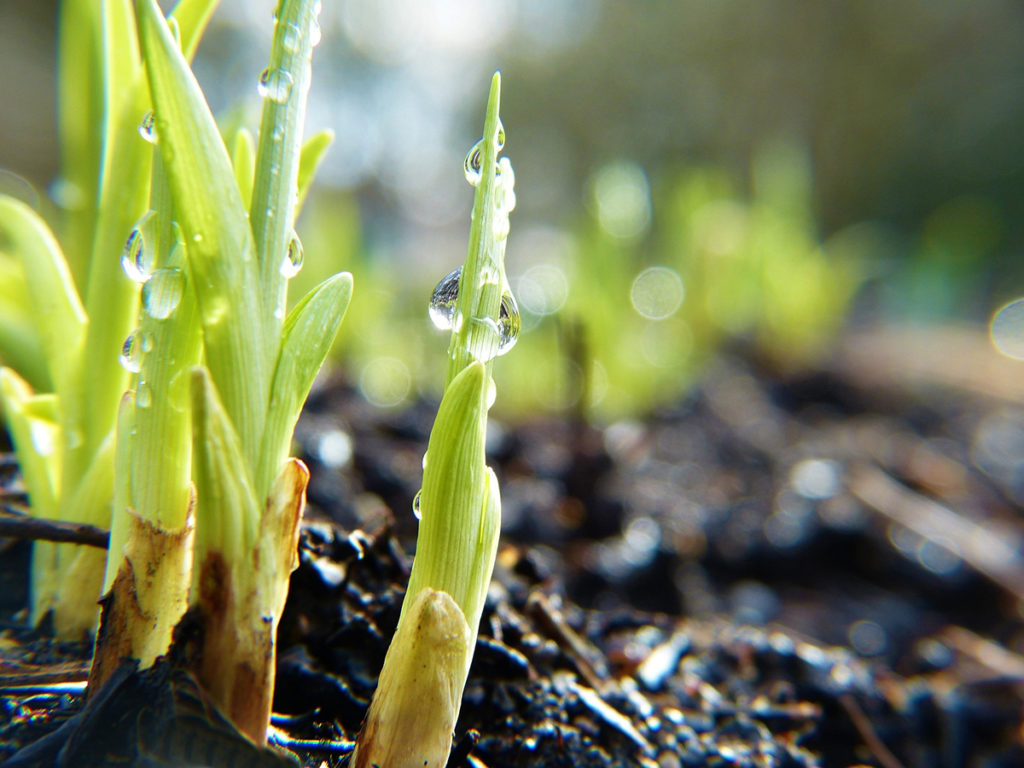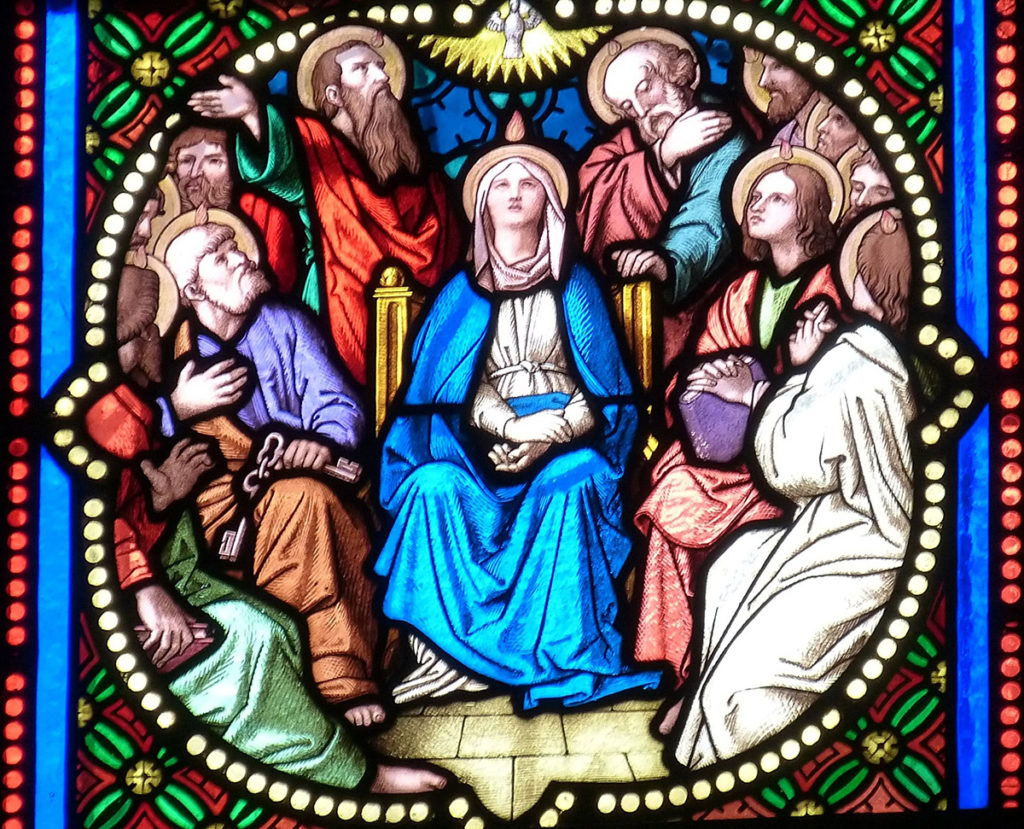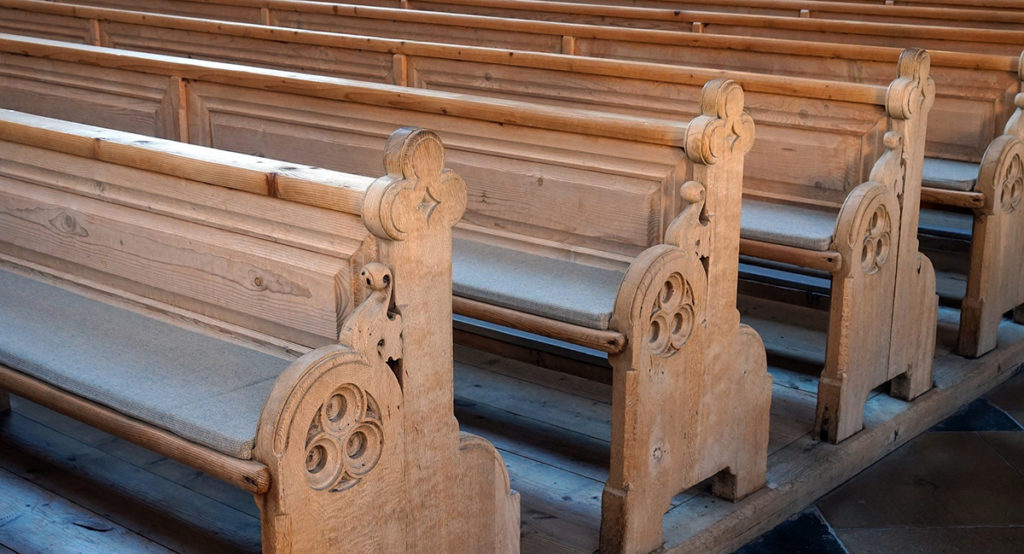
YOUTH: VOICES OF HOPE IN SOCIETY
The front cover image shows youngsters commemorating Youth Day at Orlando Stadium in Soweto, the same location where an uprising against the use of Afrikaans as a vehicular language of education took place in 1976.
Some might see June 16 only as a public holiday, nevertheless, gratitude goes to those who strived on behalf of the youth for an inclusive and better education. Many youths today still face great challenges and need strong support in order to receive an integral formation which prepares them for a bright future.
YOUTH VOICES • REVIVAL

Revival Begins with Me
The presence of the Holy Spirit, the protagonist of renewal of faith and mission, is often not sufficiently acknowledged in the spiritual life of Catholics. The charismatic experience which took place at the chapel of the University of Asbury, in Kentucky, USA, and which brought together thousands of faithful from all over the world united in prayer is an example of revival which we all long for
BY Jill Williams | Candidate Landscape Architect, Pretoria
REVIVAL SPARKS great debates amongst scholars due to its fluid nature. It is a refreshing, life-giving newness that emerges amongst the people of God and fuels further encounters with Him, for the glory of God. One such revival happened in February this year in a small chapel at the University of Asbury, in America (Griffith, 2023). Over a period of two weeks, more than fifty thousand people flocked there and people from various denominations experienced what is now regarded as one of the greatest revivals in this region (Griffith, 2023). According to Dr Mary Healy (Divine Renovation Ministry, 2023), there were some people in Asbury who prayed for decades for a revival to happen and when God began to move, there was good stewarding of the Holy Spirit—a willingness to let Him come and stay there. This required support from the student administration to accommodate this move, especially in the first few days of the revival.

Attend any Charismatic or Pentecostal church and you will hear some or other reference to revival, whether someone asks for it in prayer, or talks about the need for it in their city or nation. With revival not being specifically mentioned in the Bible, the average person would probably think that this is a relatively new trend in the Church. Revival is, however, not something new. In the Catholic Church, one would hear “Come Holy Spirit, Come” in some prayers, as well as in the “Golden Sequence” Veni Sancte Spiritus (“Come Holy Spirit”), Lord of Light, composed in the thirteenth century by the Archbishop of Canterbury, Cardinal Stephen Langton and still present in the missals today, for the Extraordinary form of Mass (Corrigan, n.d.).
Revival and Scripture
Revival is something God has been doing throughout history, from the very beginning of time. God spoke and things came to be in the earth and the heavens (Genesis 1, 2). He longed for communion with His creation and created Man specifically for this purpose. In this, we see the fruit of revival: a tangible manifestation of communion between God and His Creation. The Holy Spirit—the Power of Creation—is the first person of the Godhead that we meet in The Beginning, as we hear of the Spirit hovering over the waters (Genesis 1:1). Yet, it seems that we hear of the Holy Spirit very seldom throughout the Bible. People seem to know less about the Holy Spirit than the Father and the Son, yet the Holy Spirit has been assigned to us to be our constant companion since Jesus Ascended into Heaven.
There were some people in Asbury who prayed for decades for a revival to happen and when God began to move
Doesn’t that seem like an awkward first encounter in an arranged marriage? However, as is the case in some arranged marriages, the bride and groom are connected in some way—relationally, economically, and in this case, spiritually, before they are even born. So that first ‘meeting’ is the first tangible encounter with someone who has had an intangible connection with you for a very long time. Pentecost, the birth of the Church, can be seen as that “first meeting”. The people in Jerusalem experienced a new and fresh encounter with the God of Abraham, Isaac and Jacob, through the encounter a few disciples had in the heights of the Upper Room—revival.
The two Pentecost events
Pentecost has its roots in the Jewish feast of Shavuot or “First Fruits”, which is celebrated fifty days after the Jewish Passover (which coincides with Easter). Pentecost also coincides with the time when it is believed that Moses received the Law on Mount Sinai from God. Rich Robinson (2021) draws links between the two events. The people saw fire: the Israelites saw this falling on Mount Sinai, with smoke proceeding from it, and the disciples saw tongues of fire resting on each person’s head. In both events, they heard a sound: the sound of thunder and trumpet blasts at Sinai, and the sound of a mighty rushing wind in the Upper room. In both cases, they also felt something: The Mountain trembled and the room where the disciples were in, shook. Another thing that is common between the two events is the fact that prayer, fasting, repentance and a deep longing for God’s promise to be fulfilled, occurred in a place set apart from the rest of society.

One great difference between the two events is that the Israelites did not receive the Holy Spirit to the same measure that Moses did, as he remained in a state of deep repentance, prayer and fasting, whereas the people grew weary in waiting and began to lose focus of God. They refused to hear from God (Exodus 20:18-21). Moses thus received God’s glory, so much so that his face was completely changed, requiring him to wear a veil to protect the people from the Power of God. The disciples in the Upper Room, however, were united in their pursuit of God, knowing that Jesus had assured them of the Holy Spirit’s coming, and received Him so much so that they were able to translate this Glory to the people in the streets of Jerusalem (Acts 2:1-12). In the first event, the Law was given and brought judgment upon the people. In the other, Grace was given and brought life and freedom to them.

As Youths, we sometimes feel stifled in Church with few ‘real’ encounters with God, compared to what is experienced in Charismatic churches. The feast of Pentecost should definitely not be the only day in the Liturgical Calendar when the Holy Spirit is celebrated and spoken of in parishes. This will result in a people who are nonchalant to the daily beckoning of the Spirit of God, which is dangerous because little are the nudges of the Holy Spirit. It is in the littleness that we are able to ascend on the elevator of God’s Grace to His heart, as St Therese of Lisieux relates (Philippe, 2012). We must, however, refine our passion by passing it through the fire of the Spirit: prayerfully waiting on God. The temptation is to run and do what we think is best, but this must be placed under the authority of God for the best results. The Holy Spirit should be allowed to have His way, as Revival is something that only God can do (Divine Renovation Ministry, 2023).
Missionary Thrust
The atmosphere of prayer and repentance, coupled with a deep sense of longing for God were the main ingredients which sparked the Asbury Revival. Healings, miracles and deliverance from demonic bondages happened there, according to Dr Healy (Divine Renovation Ministry, 2023). She draws this back to the Great Commission where Jesus said that the clothing of Power from on High is what is necessary for the mission to happen (Matthew 28:16-20). Jesus allows us to be part of this when He says that where two or more are gathered in His name, He is present (Matthew 18:20). How much more two or more gathered in deep prayer and with a repentant heart will set the scene for God’s action. Lasting change is given birth through this action, which we are invited to be part of. The miracle of the languages that occurred on Pentecost (Catholic Church, 2011, no. 118), for example, required the disciples to be open to the Holy Spirit and to receive the gift of Speaking in Tongues. From the moment of this miracle, till eternity, we all are able to commune with God personally, in a heavenly language that breaks ethnic, cultural, historical, denominational and geographical boundaries.
The Holy Spirit has been assigned to us to be
our constant companion since Jesus Ascended
into Heaven.
We are an important part of the act of Revival because the Holy Spirit dwells within us. Any moment is an opportunity for revival to happen. We can experience it on a personal or communal level, from the depths of our being to the farthest corners of the universe. So, come Holy Spirit, come. Veni Sancte Spiritus.

